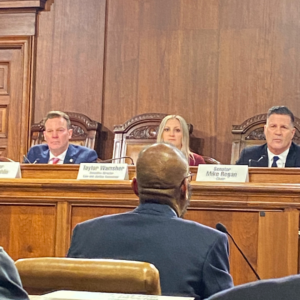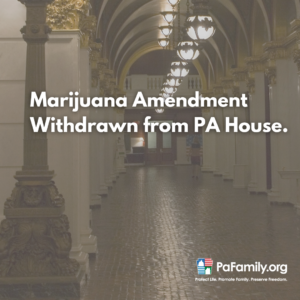PA State Rep. Amen Brown (D-Philadelphia) has recently introduced a bill, House Bill 2210 (HB2210), with a handful of cosponsors, to legalize retail marijuana for recreational use in Pennsylvania. This bill mirrors a State Senate bill, Senate Bill 846, that was introduced by Sen. Sharif Street (D-Philadelphia) and Sen. Dan Laughlin (R-Erie).
Here are three things you should know about the bill:
1. HB2210 is Big Government.
Not only would this set up a new regulatory control board, but it ***would restrict local municipalities*** from being able to opt out of pot shops in their jurisdiction. “A unit of local government, including a home rule unit or any non-home-rule county within the unincorporated territory of the county, may not enact ordinances to prohibit a cannabis business establishment from locating within the unit of local government entirely.” (pgs 109-110)
The majority of municipalities in states like New York and New Jersey that are experimenting with retail marijuana opted out of legal sales. Along with New York (58%) and New Jersey (60%), states like Colorado (64%), California (68%), and Michigan (79%) have the majority of their local governments opting out of retail marijuana sales.
2. HB2210 is Anti-Science.
Every major health association is opposed to retail marijuana legalization for recreational use. This reckless policy causes significant problems, such as increases in addictive use, particularly among youth and young adults. Social costs abound, with more drugged driving, more car accidents and fatalities, more ER visits, more mental health problems and more workplace safety risks.
In addition to the overall negative consequences of the government encouraging more use of an addictive drug through a retail marijuana market, additional problems with HB2210 include:
- Legal age set at 21: Brain development continues until age 25 (CDC). Young adults are at an increased risk for health impacts from marijuana use, particularly from high THC products. Setting a legal retail market at age 21 is going to harm more individuals still going through adolescence.
- No THC potency caps. Today’s retail market has manufactured marijuana into dangerously high potent products. The THC content of dry flower marijuana used to be in the single digits; now it can be 30% THC or more. Twenty years ago, vaping didn’t exist. Today, marijuana concentrates can be vaped in flavors that span the color of the rainbow, with THC levels reaching above 90%.
“It’s just getting worse in terms of the number of kids who are being impacted by cannabis because the potency is so high. We’re now seeing many more mental health issues – schizophrenia, psychosis, depression, anxiety. I’ve seen it and it’s scary.” Dr. Leslie Walker-Harding, Seattle Children’s (The collateral damage of high-potency cannabis: WA youth, Seattle Times, Dec 15, 2023)
3. HB2210 would help the black market, not “eradicate” it.
In this problematic bill, one task for the proposed Cannabis Regulatory Control Board is to develop procedures “to prohibit the illicit cannabis market” (pg 34). Sen. Sharif Street has claimed his bill would eradicate the black market.
Not one state experimenting with retail marijuana has come close to eliminating the black market. Not one state experimenting with retail marijuana has come close to eliminating the black market. Just look at recent headlines:
- Black market cannabis thrives in California despite legalization (NPR, April 5, 2024)
- Almost No One is Happy With Legal Weed (The Atlantic, April 8, 2024) “[A] significant part of the market is still underground, medical research is scant, and the aboveground market is not exactly thriving.”
- New York to probe sputtering legal marijuana program as storefronts lag, black market booms (Seattle Times, March 18, 2024)
- In Southern Oregon, Illegal Cannabis Has Overwhelmed the Legal Industry (Willamette Week, Dec 20, 2023)
- Alaska marijuana businesses, citing black market, plead for tax relief (Alaska Beacon, Sept 15, 2023)
Pennsylvania would be no different. In a retail-taxed market, there will always be interest in paying less through the black market. Illicit sales can use a legal market to their advantage.
BONUS Point >>> It’s disingenuous for the makers of HB2210 to link this bill to past revenue claims by PA’s Independent Fiscal Office (IFO).
The makers of HB2210 continue to make revenue projections of up to $1 billion based on the analysis made several years ago by PA’s Independent Fiscal Office (IFO). This analysis was based on tax data from Colorado’s 8-year marijuana market and California’s 3-year marijuana market (with over triple our population). “I think if we used a similar approach and similar rates as Colorado or California we’d be up anywhere from $500 – $700 million potentially. That’s just ballparking it,” stated IFO Director Matthew Knittel.
The IFO reported a 15% excise tax rate in both California and Colorado and a sales tax rate of 7.25% in California and 15% in Colorado (California also adds a wholesale tax on cultivation).
HB2210 proposes a tax rate significantly lower than CO or CA: excise tax at 10% and sales tax at 6%.
Rep. Brown, along with Sen. Street and Sen. Laughlin, have continued to use the IFO’s high revenue projections yet have a significantly lower tax rate in their proposed bill to achieve these same projections.
More importantly, all the legislative talk of “revenue” claims have failed to calculate the many costs that occur with the move to commercialize the retail sale of marijuana for recreational use.
“For Pennsylvania, any short term revenue increase will be swallowed up by the serious long term social and economic effects of legalization.” – Dr. Tom Copeland, Centennial Institute
Bottom Line
Widespread legalization of retail marijuana would be bad public policy for the families of Pennsylvania. The industry set to profit from more addictive use of this drug wants you to believe that marijuana use is harmless (it’s not), that there are no costs associated with all the projected tax revenues (there are), that law enforcement wants full legalization (they don’t), and that forcing your local municipality to market and sell high potency products – like 85% THC ‘Raspberry Rain’ flavored vapes – for retail recreational sale will benefit your community (it won’t).
Take Action
Contact your State Representative and State Senator to ask for their no vote on any bill to legalize the retail sale of marijuana in PA, like HB2210 and SB846. Click here to email.






I’ve created a petition to challenged HB2210. I would love to discuss this with someone in your organization.